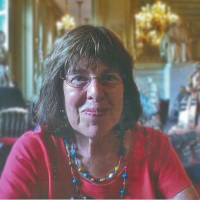An interview between Naomi Zurevinski and Deborah Gorham, author of “Liberty and Love? Dora Black Russell and Marriage,” on her experiences working in the archives with Russell’s letters, and the play Yours, Unfaithfully, which was inspired by the Russell marriage. Gorham’s article appeared in the Canadian Journal of History/Annales canadiennes d’histoire in 2011, and is available here to read for free for a limited time.
Deborah Gorham, a history professor at Carleton University in Ottawa, Ontario, has always loved teaching, even from a young age.
“I was a big sister, with a younger sister and brother. I would make them play school, and I was always the teacher. I loved teaching. I loved research too, but for much of my career, teaching came first,” Gorham said.
One of the research topics that has sparked her interest, is the life, marriage, and work of Dora Black Russell (1894-1986). Black Russell was a British author, feminist, and social entrepreneur, who was famously married to Bertrand Russell (1872-1970), an English philosopher, mathematician, writer, and political activist, among other things. The two were married in 1921, but divorced 15 years later.
In 2011, CJH/ACH published an article by Gorham titled “Liberty and Love? Dora Black Russell and Marriage,” which examines modernist marriage in the interwar period in Britain, by looking at Black Russell’s experience. Gorham became interested in Black Russell because of her work as an educational entrepreneur, and spent a lot of time researching the archives of both Black Russell and Bertrand Russell.
“Dora Black Russell’s papers are at the Institute for Social History in Amsterdam. Bertrand Russell’s papers are at McMaster University in Hamilton, Ontario. It was wonderful, as well as exhausting, to use the Dora papers in Amsterdam. They are voluminous. The archivists there were so very helpful — they all speak English,” Gorham said. “I stayed in the house of one of the archivists — she’s now retired — and we became really good friends. I wrote on index cards, then typed on my laptop, and photocopied a whole lot. I made several trips, and spent weeks and weeks and weeks there.”
As part of Gorham’s work on Black Russell, she was asked to give a talk for the “Enrichmint” program as part of the play, Yours, Unfaithfully, by Miles Malleson, which was put on by the Mint Theatre Company in New York.
“Miles Malleson’s play — wonderfully recreated by the Mint — is about ‘free love’ in the 1920s and 1930s. Is it about the Russell marriage? In part. Anne, the character in the play, and Dora in real life, did support free love. The lesson is that this is never going to work out for women as long as we live in a patriarchal society. It may not work out even then: jealousy is a powerful emotion,” Gorham said.
Free love is the idea and practice that you can have sexual relationships according to choice, even within a marriage, which was something that Dora and Bertrand believed in and participated in, which contributed to the eventual demise of their marriage.
Although she garnered fame through her marriage to Bertrand Russell, when it ended in 1935 Black Russell continued writing and participating in feminist causes, becoming known for her activism and work.
Gorham’s work, “Liberty and Love? Dora Black Russell and Marriage” is free to read for a limited time. Click here to read the article on CJH Online – http://bit.ly/CJH462_Gorham

Comments on this entry are closed.